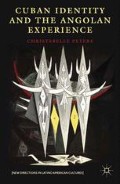Abstract
In geographical terms, “The Bright Country” refers to a region in West Africa located within the current national boundaries of Mali, which, due to its close proximity to the equator, is bathed in strong sunlight all year round. The area receives very little rain, and so the effect of brightness is intensified by the dry light-colored soil in mainly pale yellow and red tones. There is also an old West African belief that light connects the physical and spiritual worlds, thus “The Bright Country” refers to a place where we could say that “the physical world is in closest contact with the spiritual world.”2 It is a spirit world, in the sense of ghosts, memories, and feelings.
The territory may be defined as the reverse of space. It is based on an idea and often on an ideal, whereas space is material.1
Access this chapter
Tax calculation will be finalised at checkout
Purchases are for personal use only
Preview
Unable to display preview. Download preview PDF.
Notes
Ángel Augier, “El Caribe en la poesía de Nicolás Guillén,” Revolución y Cultura, 82 (1979): 22.
Luís Suardíaz, “Crónica de CARIFESTA,” Revolución y Cultura, 82 (1979): 46.
Fidel Castro, “Es deber de nuestros pueblos unirse y cooperar estrechamente entre sí, frente a la política neocolonialista y de dominio imperial que los Estados Unidos establecieron sobre nuestros pueblos,” Casa de las Américas, 91, Julio–Agosto (1975): 13.
Marcus Garvey, “Fragmentos,” Casa de las Américas, 91, Julio–Agosto (1975): 51.
C. L. R. James, “De Toussaint L’Ouverture a Fidel Castro,” Casa de las Américas, 91, Julio–Agosto (1975): 68.
Copyright information
© 2012 Christabelle Peters
About this chapter
Cite this chapter
Peters, C. (2012). “One Caribbean Sun”. In: Cuban Identity and the Angolan Experience. New Directions in Latino American Cultures. Palgrave Macmillan, New York. https://doi.org/10.1057/9781137119285_8
Download citation
DOI: https://doi.org/10.1057/9781137119285_8
Publisher Name: Palgrave Macmillan, New York
Print ISBN: 978-1-349-34370-6
Online ISBN: 978-1-137-11928-5
eBook Packages: Palgrave Political & Intern. Studies CollectionPolitical Science and International Studies (R0)

